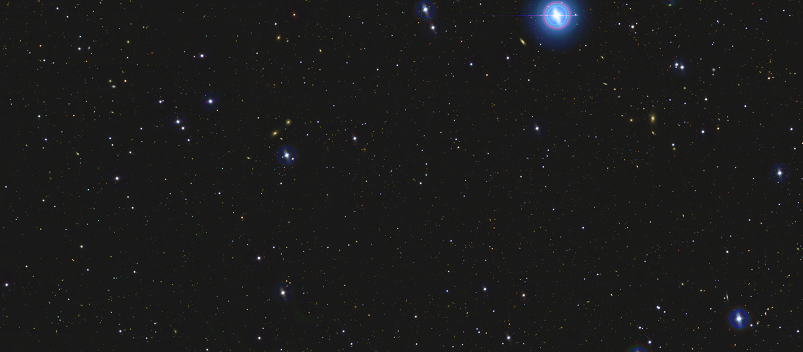Astrophysics
Understanding the formation of galaxies and their components, from globular clusters to supermassive black holes

Credit: J-PAS collaboration
This research line focuses on various aspects of galaxy formation and evolution. Both simulations and observations are used to understand how galaxies form and their properties evolve across the cosmological evolution of the Universe.
Specific topics
- Development of theoretical models for studying the formation, growth and mergers of massive black holes within their host galaxies.
- Use of wide-area surveys to study active galaxies across redshift.
- Use of hydrodynamical simulations to understand the formation of bar structures within galaxies and their role in shaping the global properties of the host galaxies.
- Study of globular cluster properties.
Related publications
-
 1
TREASUREHUNT: transients and variability discovered with HST in the JWST north eliptic pole time-domain field
1
TREASUREHUNT: transients and variability discovered with HST in the JWST north eliptic pole time-domain field
R. O'Brien, R. A. Jansen, N. A. Grogin, S. H. Cohen, B. M. Smith, R. M. Silver, W. P. Maksym III, R. A. Windhorst, T. Carleton, A. M. Koekemoer, N. P. Hathi, C. N. A. Willmer, B. L. Frye, M. Alpaslan, M. L. N. Ashby, T. A. Ashcraft, S. Bonoli, W. Brisken, N. Cappelluti, F. Civano, et al.
Astrophys. J. Suppl. Ser. 272, 1 (2024). -
 2
Stochastic wave dark matter with Fermi-LAT γ-ray pulsar timing array
2
Stochastic wave dark matter with Fermi-LAT γ-ray pulsar timing array
Hoang Nhan Luu , T. Liu, J. Ren, T. Broadhurst, R. Yang, J. -S. Wang, and Z. Xie
Astrophys. J. Lett. 963, 2 (2024). -
 3
A magnified compact galaxy at redshift 9.51 with strong nebular emissionlines
3
A magnified compact galaxy at redshift 9.51 with strong nebular emissionlines
H. Williams, P. L. Kelly, W. Chen, G. Brammer, A. Zitrin, T. Treu, C. Scarlata, A. M. Koekemoer, M. Oguri, Y. -H. Lin, J. M. Diego, M. Nonino, J. Hjorth, D. Langeroodi, T. Broadhurst, N. Rogers, I. Perez-Fournon, R. J. Foley, S. Jha, V. Filippenko, et al.
Science 380, 416 (2023). -
 4
Einstein rings modulated by wavelike dark matter from anomalies ingravitationally lensed images
4
Einstein rings modulated by wavelike dark matter from anomalies ingravitationally lensed images
A. Amruth, T. Broadhurst, J. Lim, M. Oguri, G. F. F. Smoot, J. M. M. Diego, E. Leung, R. Emami, J. Li, T. Chiueh, H. -Y. Schive, M. C. H. Yeung, and S. K. Li
Nat. Astron. 7, 736 (2023). -
 5
Overmassive black holes in dwarf galaxies out to z similar to 0.9 in the VIPERS survey
5
Overmassive black holes in dwarf galaxies out to z similar to 0.9 in the VIPERS survey
M. Mezcua, M. Siudek, H. Suh, R. Valiante, D. Spinoso, and S. Bonoli
Astrophys. J. Lett. 943, 1 (2023). -
 6
Subhalo abundance matching through the lens of a hydrodynamicalsimulation
6
Subhalo abundance matching through the lens of a hydrodynamicalsimulation
G. Favole, A. D. Montero-Dorta, M. C. Artale, S. Contreras, I. Zehavi, and X. Xu
Mon. Not. Roy. Astron. Soc. 509, 1614 (2022). -
 7
Shock cooling of a red-supergiant supernova at redshift 3 in lensedimages
7
Shock cooling of a red-supergiant supernova at redshift 3 in lensedimages
W. Chen, P. L. Kelly, M. Oguri, T. J. Broadhurst, J. M. Diego, N. Emami, V. Filippenko, T. L. Treu, and A. Zitrin
Nature 611, 256 (2022). -
 8
J-PLUS: Spectral evolution of white dwarfs by PDF analysis
8
J-PLUS: Spectral evolution of white dwarfs by PDF analysis
C. Lopez-Sanjuan, P. -E. Tremblay, A. Ederoclite, H. V. Ramio, J. M. Carrasco, J. Varela, A. J. Cenarro, A. Marin-Franch, T. Civera, S. Daflon, B. T. Gansicke, N. P. G. Fusillo, F. M. Jimenez-Esteban, J. Alcaniz, R. E. Angulo, D. Cristobal-Hornillos, R. A. Dupke, C. Hernandez-Monteagudo, M. Moles, and J. Sodre, et al.
Astron. Astrophys. 658, (2022). -
 9
A highly magnified star at redshift 6.2
9
A highly magnified star at redshift 6.2
B. Welch, D. Coe, J. M. Diego, A. Zitrin, E. Zackrisson, P. Dimauro, Y. Jimenez-Teja, P. Kelly, G. Mahler, M. Oguri, F. X. Timmes, R. Windhorst, M. Florian, S. E. de Mink, R. J. Avila, J. Anderson, L. Bradley, K. Sharon, A. Vikaeus, S. McCandliss, et al.
Nature 603, 815 (2022). -
 10
J-PAS: Measuring emission lines with artificial neural networks
10
J-PAS: Measuring emission lines with artificial neural networks
G. Martinez-Solaeche, R. M. Gonzalez Delgado, R. Garcia-Benito, A. de Amorim, E. Perez, J. E. Rodriguez-Martin, L. A. Diaz-Garcia, R. Cid Fernandes, C. Lopez-Sanjuan, S. Bonoli, A. J. Cenarro, R. A. Dupke, A. Marin-Franch, J. Varela, H. Vazquez Ramio, L. R. Abramo, D. Cristobal-Hornillos, M. Moles, J. Alcaniz, P. O. Baqui, et al.
Astron. Astrophys. 647, (2021).
